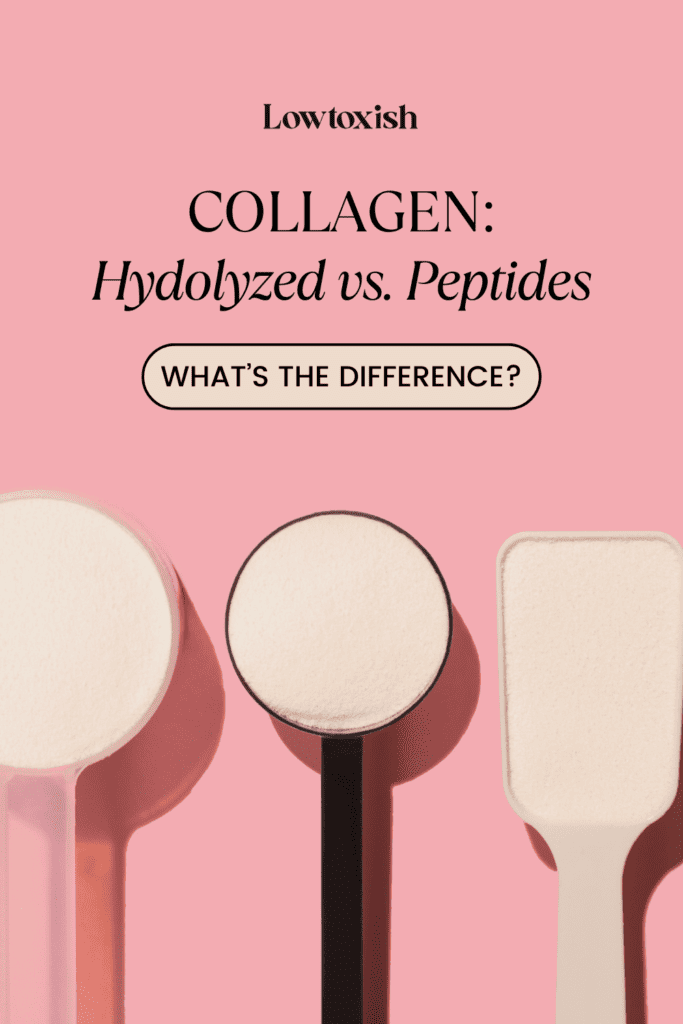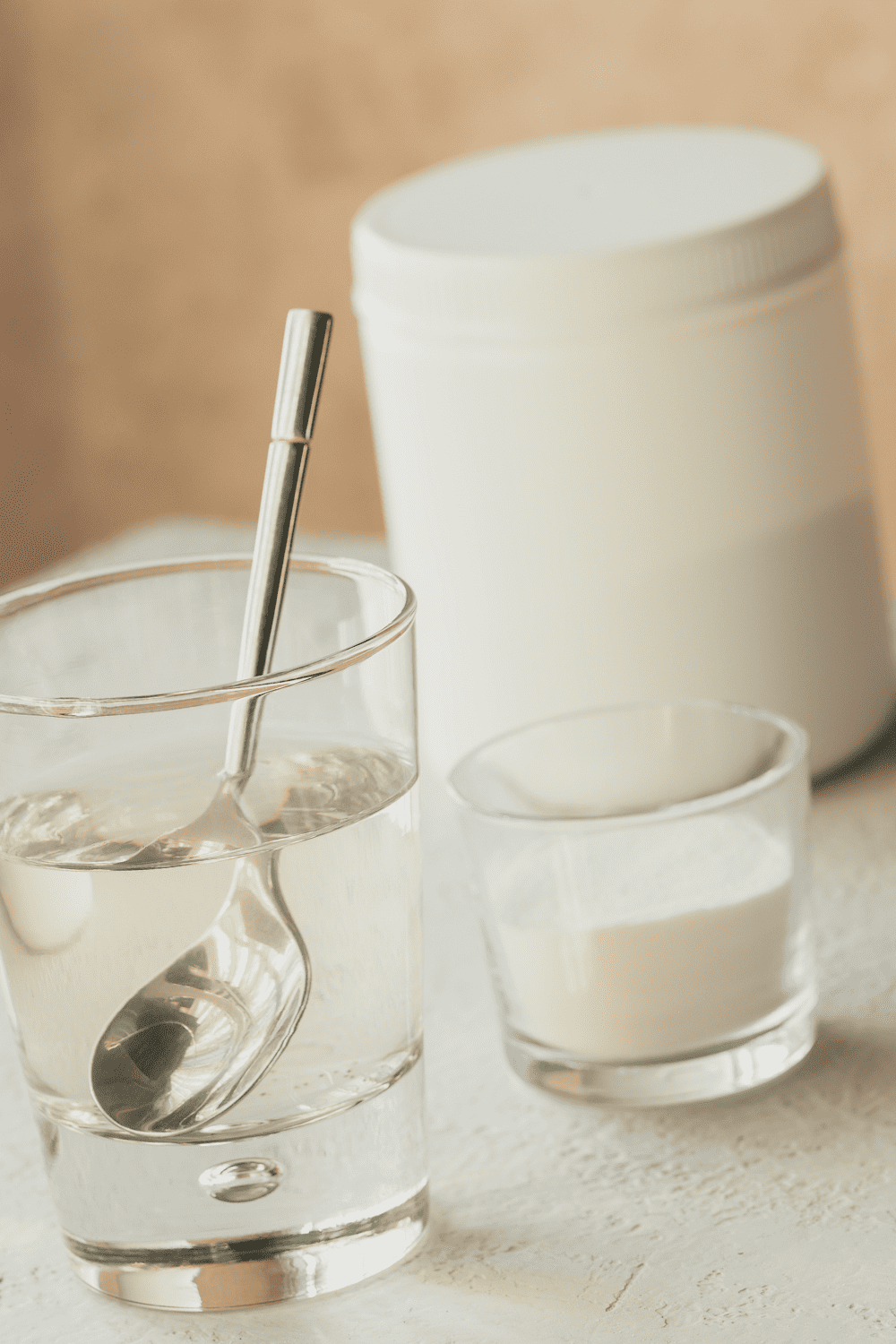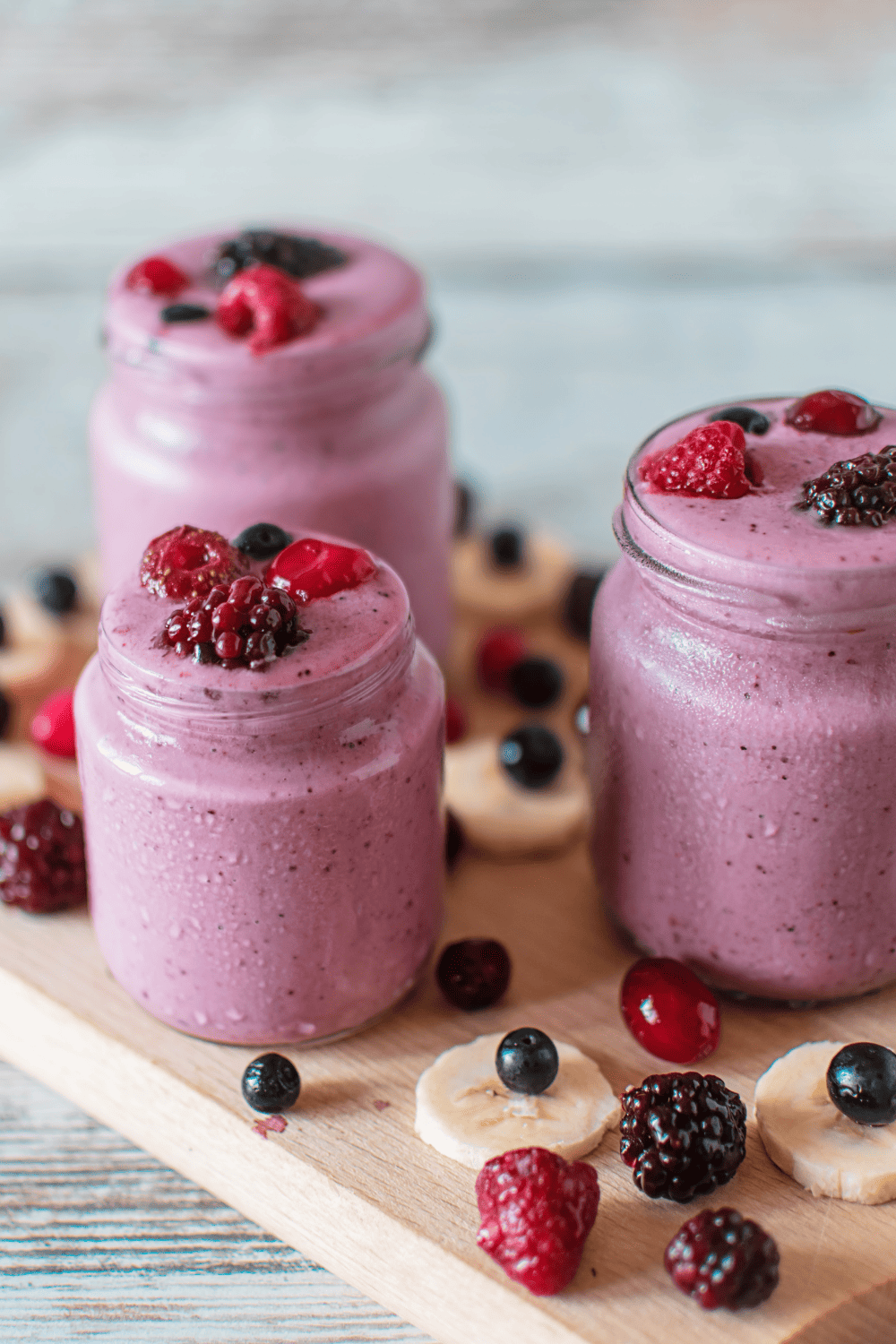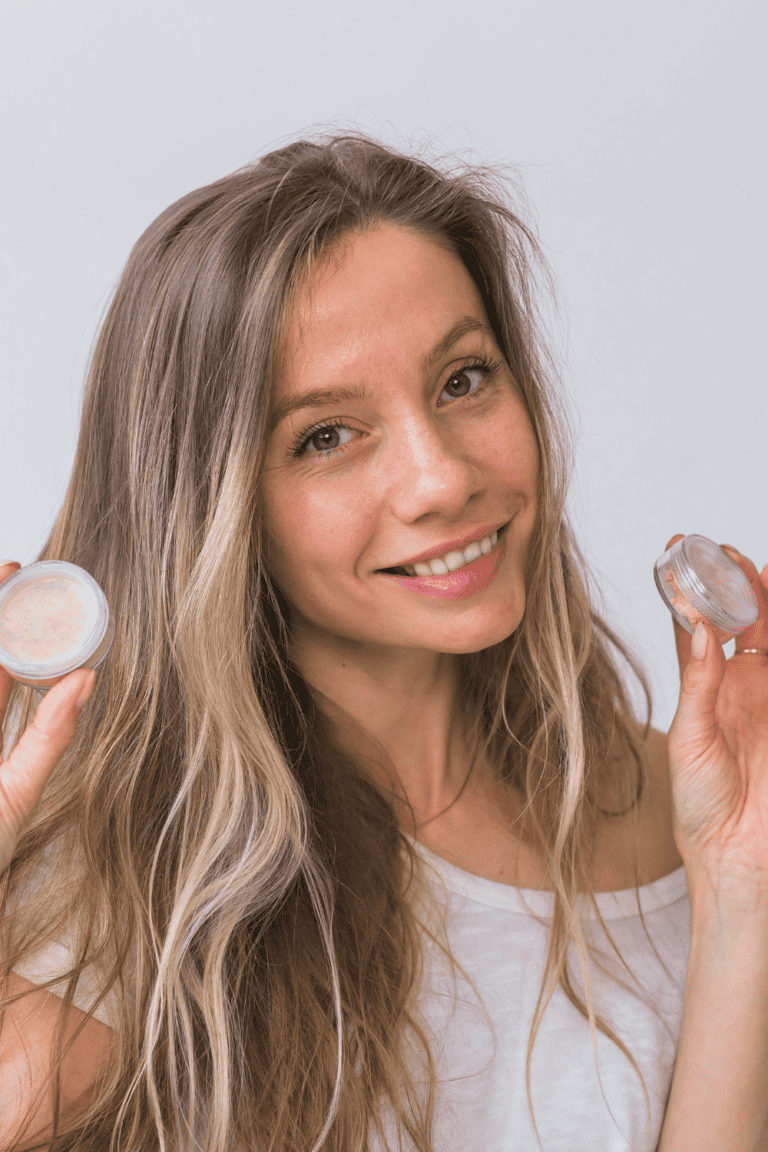Collagen: Hydrolyzed vs. Peptides : What’s The Difference?
Welcome to our guide on hydrolyzed vs. peptides. If you’ve been exploring collagen supplements, you’ve likely come across these terms.
But what exactly do they mean, and how do they differ? In this article, we’ll delve into the nuances of hydrolyzed collagen and collagen peptides, helping you make an informed choice for your health and wellness journey.

This post about hydrolyzed vs. peptides may contain affiliate links, which means I’ll receive a commission if you purchase through my link, at no extra cost to you.
What’s the Buzz About Collagen?
In recent years, collagen has surged from a niche health supplement to a staple in the wellness and beauty community. This buzz isn’t without good reason. Collagen is the most abundant protein in our bodies, playing a crucial role in various biological functions.
It provides structural support to skin, bones, and connective tissues, making it vital for maintaining the overall integrity and youthfulness of our bodies.
As the most abundant protein, its presence is critical for the health of our skin, joint mobility, and much more, underscoring why so many are turning to collagen supplements to boost their intake.
I personally can tell a difference in the fine lines on my face when I am taking collagen.
The Role of Collagen in the Human Body
Collagen is the most abundant protein in the human body, serving as a crucial component of skin, bones, and connective tissues.
Each collagen molecule is a complex structure that contributes to the strength and elasticity of these tissues. However, as we age, our body’s natural production of collagen decreases, which is where dietary supplements like hydrolyzed collagen and collagen peptides come into play.
They provide the human body with the necessary building blocks to replenish diminishing collagen levels.
The Vital Role of Vitamin C in Collagen Synthesis
An essential factor in collagen production within the human body is Vitamin C. This powerhouse vitamin acts as a catalyst for synthesizing collagen, making it crucial for enhancing the effectiveness of collagen peptide supplements.
Without adequate Vitamin C, the body struggles to rebuild collagen, leading to less collagen and the visible signs of aging.
Incorporating Vitamin C-rich foods or supplements alongside collagen peptide supplements can significantly boost collagen production, ensuring optimal benefits for skin health, joint flexibility, and overall wellness.
Addressing the Decline of Collagen
As we age, our bodies naturally produce less collagen, leading to weaker connective tissues and the appearance of wrinkles and sagging skin. This reduction in collagen production highlights the importance of supplementing with collagen peptide supplements.
These supplements provide specific amino acids needed to stimulate collagen synthesis in the body, counteracting the natural decline and supporting the maintenance of healthy skin, bones, and joints.”
This integration offers readers a comprehensive understanding of how Vitamin C and collagen peptide supplements work together to combat the natural decline of collagen production, providing a clear and informative narrative on maintaining health and wellness through targeted supplementation
What is the difference? Hydrolyzed vs. Peptides
It’s pretty confusing but basically all supplement forms of collagen are hydrolyzed and “collagen peptides” are almost always refer to the same thing as “hydrolyzed collagen” or “hydrolyzed collagen peptides”.
Understanding Hydrolyzed Collagen: Hydrolyzed vs. Peptides
Alright, so now that we know that it’s all the same, what’s the deal with hydrolyzed collagen?
Also known as collagen hydrolysate, this form of collagen undergoes a process called hydrolysis, where those large collagen molecules are broken down into smaller, more absorbable pieces so that you are able to absorb and digest the amino acids like glycine, proline, and hydroxyproline
This not only makes collagen hydrolysate supercharged for absorption by your body but also ready to work its magic in promoting joint, skin, and gut health.
Essentially, collagen hydrolysate is designed to be easily utilized by your body, ensuring that you get the most out of your collagen supplementation.

What Makes Hydrolyzed Collagen Special?
So, why all the hype around hydrolyzed collagen? For starters, it’s all about bioavailability. Thanks to the hydrolysis process, this collagen is easier for your body to absorb and use.
That means you’re getting more bang for your buck when it comes to reaping those collagen benefits.
Exploring Collagen Peptides

The Lowdown on Collagen Peptides: Hydrolyzed vs. Peptides
So, what are collagen peptides anyway? Think of them as the MVPs of collagen—small, mighty, and ready to work wonders in your body.
Unlike other forms of collagen, collagen peptides are broken down into smaller, more digestible molecules, making them easier for your body to absorb and use. Translation? You get all the benefits of collagen in a form that your body can put to good use.
The hydrolysis process of collagen can be adjusted to create peptides of different sizes.
So, now you might be able to see how hydrolyzed collagen is simply collagen that has gone through the process of hydrolysis to create smaller collagen peptides.
Yes, you could have collagen peptides, that naturally occur in collagen without the process of being hydrolyzed but when you hear collagen marketed as “collagen peptides” or “hydrolyzed collagen” you are being told that the collagen has undergone hydrolysis to create smaller peptide chains.
Benefits of Hydrolyzed Collagen Peptides
Hydrolyzed collagen isn’t just your average supplement—it’s a powerhouse of health benefits packed into one convenient package. Let’s take a closer look at why hydrolyzed collagen deserves a spot in your daily routine.
Amino Acid Profile: Hydrolyzed vs. Peptides
The process makes it easier to supplement load, easier to digest, and easier to dissolve into liquids.
According to this article, “Collagen, irrespective of its origin, contains 19 amino acids, including hydroxyproline which does not occur in other proteins. Its atypical amino acid composition is characterized by high content of proline and glycine, as well as the absence of cysteine.”
There have been roughly 500 amino acids discovered in nature but complete protein contains 20 amino acids and the human body needs all 20 of these amino acids.
There are 9 amino acids that your body can not make and you have to get from food and they are referred to as the “essential amino acids”:
- Histidine: Essential for producing histamine, impacting immune response, digestion, sleep, and sexual health.
- Isoleucine: Supports muscle metabolism, immune function, hemoglobin production, and energy regulation.
- Leucine: Crucial for protein synthesis, growth hormone production, muscle repair, wound healing, and blood sugar management.
- Lysine: Involved in hormone and energy production, important for calcium absorption and immune function.
- Methionine: Aids in tissue growth, metabolism, detoxification, and absorption of essential minerals.
- Phenylalanine: Necessary for the production of brain neurotransmitters and other amino acids.
- Threonine: Contributes to collagen and elastin structure, blood clotting, fat metabolism, and immune function.
- Tryptophan: Helps maintain nitrogen balance and produces serotonin, regulating mood, appetite, and sleep.
- Valine: Involved in muscle growth, tissue regeneration, and energy production.
Collagen primarily consists of glycine, proline, hydroxyproline, and arginine so while it is excellent for your health, it can’t be your only form of protein that you consume.
Foods that contain all nine essential amino acids are known as “complete proteins.” These include animal-based products like meat, poultry, fish, eggs, and dairy.
For plant-based options, quinoa, buckwheat, soy products (tofu, tempeh), and spirulina are complete proteins. Additionally, combining various plant-based foods, such as rice and beans, can provide a full profile of essential amino acids.
Joint Support
First and foremost, hydrolyzed collagen is like a superhero for your joints.
By stimulating the production of cartilage and connective tissues, it helps reduce joint pain, stiffness, and inflammation, allowing you to move more freely and comfortably.
Whether you’re an athlete pushing your limits or simply looking to stay active as you age, hydrolyzed collagen has got your back—literally!
Skin Rejuvenation
But the benefits of hydrolyzed collagen don’t stop there—oh no! This mighty supplement is also a game-changer for your skin.
By promoting collagen synthesis and improving skin elasticity, it helps reduce the appearance of wrinkles, fine lines, and sagging skin, leaving you with a radiant, youthful complexion. Say goodbye to expensive skincare products and hello to glowing, healthy skin!
I primarily use collagen for it’s effects on my skin and as a additional protein source.
Gut Health Support
But wait, there’s more! Hydrolyzed collagen isn’t just good for your joints and skin—it’s also a gut health superhero. Collagen plays a crucial role in maintaining gut integrity and supporting digestive function.
By nourishing the lining of your digestive tract, hydrolyzed collagen helps prevent leaky gut syndrome and other digestive issues, leaving you feeling happy, healthy, and energized from the inside out.
Muscle Recovery
Calling all fitness enthusiasts! Hydrolyzed collagen is here to take your workouts to the next level.
Thanks to its high protein content and amino acid profile, hydrolyzed collagen supports muscle repair and recovery, allowing you to bounce back faster after tough workouts.
Whether you’re hitting the gym, pounding the pavement, or crushing it in your home workouts, hydrolyzed collagen is your secret weapon for staying strong, fit, and healthy.
Bone Health
Last but certainly not least, hydrolyzed collagen is essential for maintaining strong, healthy bones. As we age, collagen production naturally declines, leading to bone loss and increased risk of fractures and osteoporosis.
But with hydrolyzed collagen by your side, you can give your bones the support they need to stay strong and resilient for years to come. Say hello to a lifetime of healthy, happy bones!
Hydrolyzed vs. Peptides: How to Incorporate into Meals
Now that you’ve chosen the perfect collagen supplement for your needs, it’s time to explore the myriad ways you can incorporate hydrolyzed collagen and collagen peptides into your daily routine.
From delicious recipes to simple beverages, there are countless creative and convenient ways to enjoy the benefits of collagen supplementation. Let’s dive into some practical tips and ideas to help you seamlessly integrate these powerhouse proteins into your lifestyle.
I find collagen peptides to add a creamy texture to liquids they are added too and I have never noticed a negative taste or any texture when I add them to liquids.
Stir Into Your Morning Coffee or Tea
One of the easiest ways to enjoy the benefits of collagen is by stirring a scoop of hydrolyzed collagen or collagen peptides into your morning coffee or tea.
The heat from your beverage will help dissolve the collagen powder, creating a creamy, frothy texture that blends seamlessly with your favorite brew. Say goodbye to bland, flavorless supplements and hello to a delicious, nourishing start to your day.
Blend Into Smoothies and Shakes
Another popular way to incorporate collagen into your diet is by blending it into smoothies and shakes.
Simply add a scoop of collagen powder to your favorite smoothie recipe for an extra boost of protein and nutrition. Here’s a post with some of my favorite collagen powders and smoothie recipes.
Whether you prefer fruity blends or decadent chocolate shakes, collagen peptides and hydrolyzed collagen can easily be incorporated into any smoothie concoction for a tasty and nutritious treat.
Mix Into Yogurt or Oatmeal
For a quick and convenient way to boost your collagen intake, try mixing collagen powder into your morning yogurt or oatmeal.
The creamy texture of yogurt and the comforting warmth of oatmeal provide the perfect canvas for incorporating collagen peptides or hydrolyzed collagen.
Simply stir the powder into your yogurt or oatmeal until fully combined, and enjoy a nourishing and satisfying breakfast that supports your health and well-being.
Bake Into Homemade Treats
Get creative in the kitchen by baking collagen powder into your favorite homemade treats.
From cookies and muffins to pancakes and waffles, collagen peptides and hydrolyzed collagen can easily be incorporated into a wide variety of baked goods for an added protein boost.
Experiment with different recipes and flavor combinations to discover new and delicious ways to enjoy the benefits of collagen supplementation.
I do find that sometimes collagen can get gummy if not VERY well mixed when baking so blend blend blend before you bake.
Enhance Soups and Stews
Elevate the nutritional value of your favorite soups and stews by adding collagen powder to the mix.
Whether you’re simmering a hearty vegetable soup or whipping up a comforting chicken stew, collagen peptides and hydrolyzed collagen can be seamlessly incorporated into savory dishes for an extra dose of protein and flavor.
Simply stir the collagen powder into your soup or stew until fully dissolved, and enjoy a nourishing and satisfying meal that supports your health and well-being.
Sprinkle Over Salads and Snacks
For a quick and easy way to add collagen to your diet, try sprinkling collagen powder over salads and snacks.
Whether you’re enjoying a leafy green salad or munching on crunchy veggie sticks, collagen peptides and hydrolyzed collagen can be sprinkled directly onto your favorite foods for an added protein boost.
Get creative with your toppings and experiment with different flavor combinations to create delicious and nutritious meals and snacks that support your health and well-being.
I’m going to be honest, I haven’t tried this application and mainly because it’s so dang easy to add them to liquids that there’s never been a need to add them to food as a topping.
Conclusion: Hydrolyzed vs. Peptides
In wrapping up our exploration of hydrolyzed vs. peptides, we have concluded that these two terms refer to the same collagen product/type and that hydrolyzation is just the process that is used to create smaller more bio-available peptides.
The use of hydrolyzed collagen peptides leads to better connective tissue health, joint support, and muscle strength.
Hydrolyzed for enhanced absorption, these supplements—backed by clinical studies—can be seamlessly integrated into daily routines, dissolving easily in cold liquids.
Whether seeking to bolster the health of blood vessels, promote healthy hair, or support the digestive system, consulting a healthcare provider can help tailor the right collagen approach to fit individual wellness goals.
This post was about hydrolyzed vs peptides.
More posts like this…
Liquid Collagen vs Powder Collagen: The Ultimate Guide
10 Amazing AIP Breakfast Smoothies to Try Using AIP Safe Protein Powders
Gluten and Dairy Free PCOS Recipes For Balancing Hormones
The 16 Best Alternative Cooking Spray Options For Healthy Cooking













